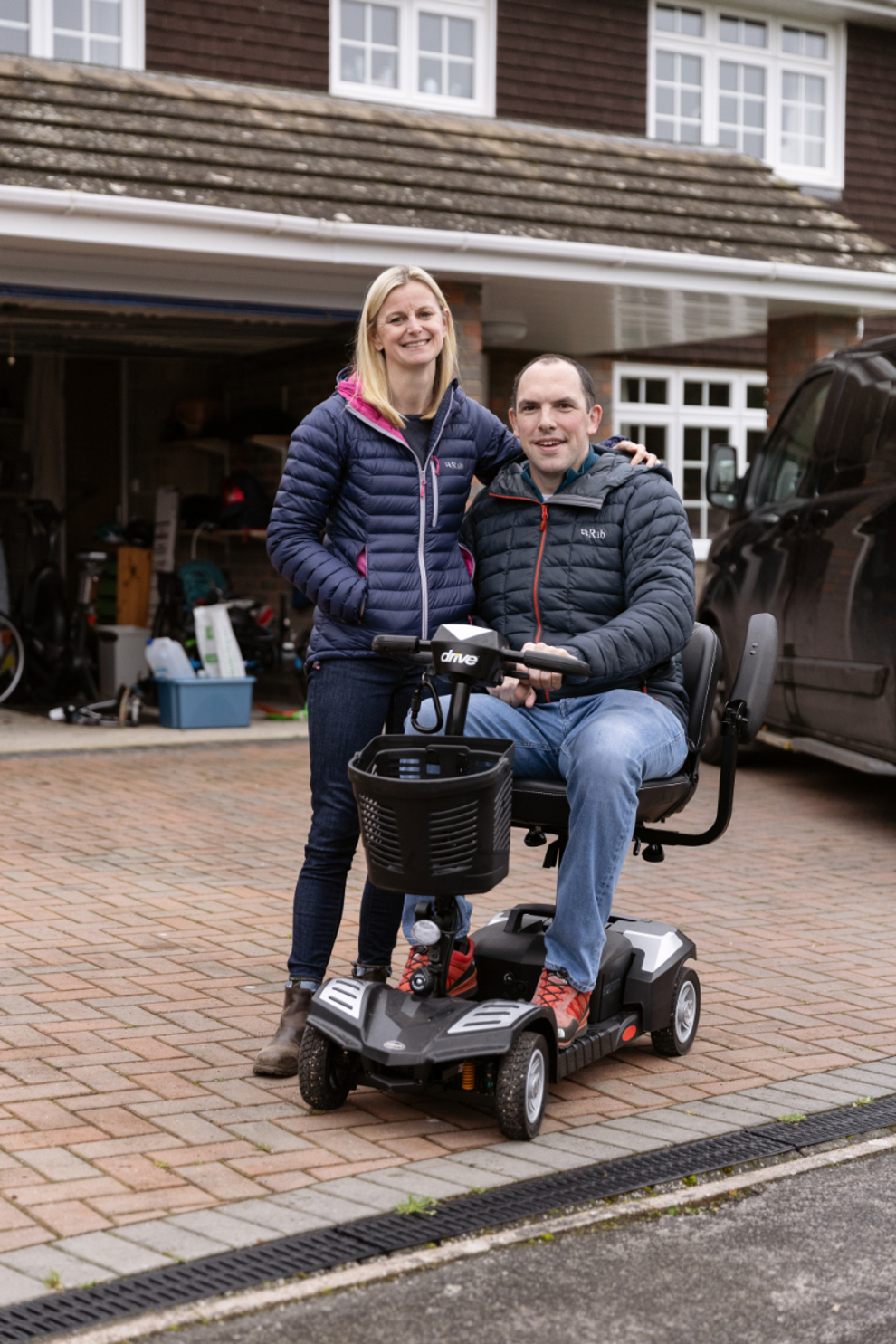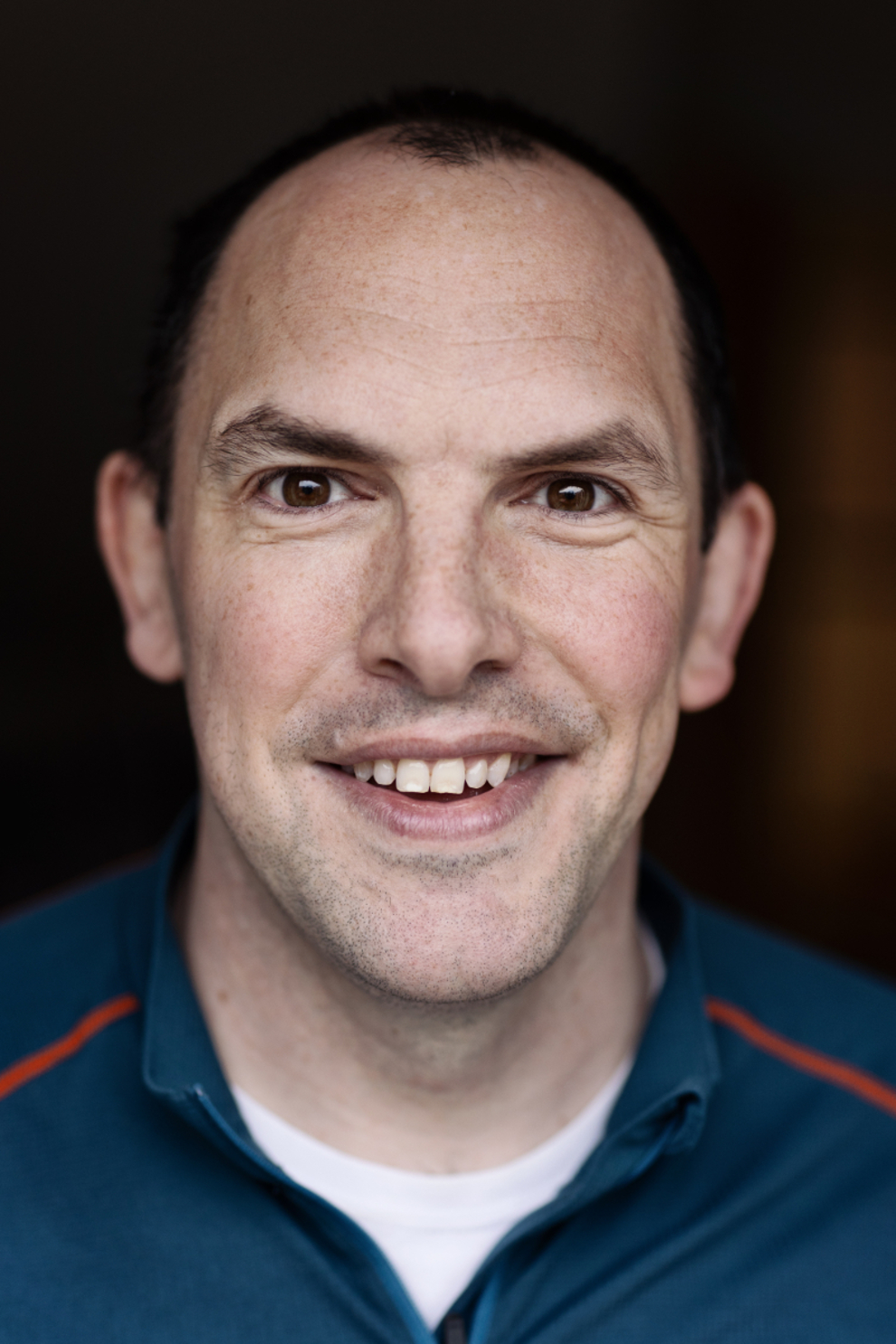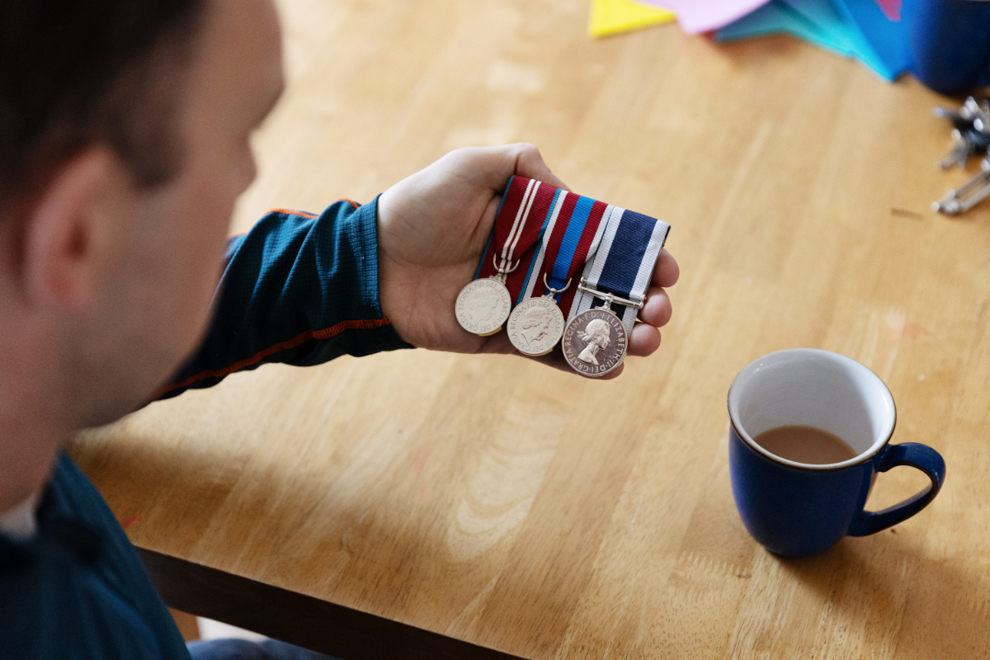Ryan Thomas was a Surgeon Lieutenant Commander in the Royal Navy when his aorta ruptured causing a life-changing stroke. his wife, Liz, left her career to steer their young family through whatever came next.
Fast, cool and wow!” Ryan Thomas’ face lights up with a smile as he recalls the sweeping runs of La Plagne and the challenge of improving his sit-ski technique. “The food and hotel were great, too. It was all so good.” Ryan has aphasia so his speech is not fluent, but the joy that radiates from him as he talks is obvious. He has recently come back from Blesma’s ski week in the French Alps where the group were put through their paces every day by a dedicated team of instructors before enjoying the après-ski camaraderie of other veterans.
“It was a fantastic week for all of us,” says Ryan’s wife, Liz. “Because Ryan was so well supported and his needs so well understood, we could all relax knowing that he was safe. He loved skiing before he had the stroke and it was fantastic for him to be able to get out on the slopes and enjoy it again.
“He had been going through a particularly tough period dealing with his recovery and his sense of purpose, so the trip came at just the right time. He really loved it and loved being around other veterans.”
Ryan was living life to the full as a Surgeon Lieutenant Commander in the Royal Navy when, at the age of 37 and destined for higher rank, he suffered a devastating stroke.
It caused lasting cognitive and physical impairment, derailed his career and set his family on a difficult journey to recalibrate their lives and for Ryan to redefine his sense of purpose.
Ryan was fully committed to his family – his children were aged just six and four at the time – and to the Royal Navy, where he revelled in the demands of four-month submarine missions and being an integral part of Faslane’s HMS Neptune Field Gun team. But all that changed in an instant some six years ago.
He was still unconscious, but he started crying when he heard their voices and we thought: ‘He’s in there, he knows something.’
REHABILITATION
“On the verge of starting a prestigious Masters’ course in occupational medicine, Ryan returned home from a regular day at the Institute of Naval Medicine in Gosport on 22 May 2018 and went to bed with a headache,” says Liz, who met Ryan just after she graduated in law from Southampton University where he was studying medicine after completing a pharmacology degree. “But in the middle of the night, I woke up to the sound of a crash. Ryan was on the floor trying to get back into bed. He was pulling things over as he tried to get back up, and it was clear there was something seriously wrong.”
He was rushed to hospital and needed 12-hour surgery on his aorta – the largest blood vessel in the body that carries blood from the heart – as it had become damaged causing a blood clot to travel to his brain. Initially, surgeons had to battle to save Ryan’s life and then to minimise the damage caused by the clot which had restricted oxygen supply to his brain.
“We had to wait for Ryan to wake up in intensive care to know the full extent by three months at Headley Court, where Ryan had spent time for his final medical training, and a further 16 months at The Defence and National Rehabilitation Centre at Stanford Hall.


“Our lives took a fork in the path and, because it was such an extreme turn, I don’t reflect back much. I don’t think it is helpful,” says Liz. “I don’t think we’ll ever quite get over what happened, so we look forward to each day and place a lot of focus on helping give the children the best life they can have. “We have met some amazing people and our lives have changed in different ways, and there are elements that I’m pleased have happened. We’ve met some really inspirational people who have become good friends.
“We’ve always had a very positive outlook and enjoy the small wins – such of the neurological damage,” says Liz. “He didn’t respond to anything for the first three weeks until I brought the children into the Intensive Care Unit for the first time. He was still unconscious, but he started crying when he heard their voices and we thought: ‘He’s in there, he knows something.’ It was a wonderful moment. When he did wake up he had no speech, and no movement on his right hand side.” But the joy of having Ryan back was tempered by the reality of the difficult journey ahead. An initial period of rehab in Southampton Hospital was followed by three months at Headley Court, where Ryan had spent time for his final medical training, and a further 16 months at The Defence and National Rehabilitation Centre at Stanford Hall.
“Our lives took a fork in the path and, because it was such an extreme turn, I don’t reflect back much. I don’t think it is helpful,” says Liz. “I don’t think we’ll ever quite get over what happened, so we look forward to each day and place a lot of focus on helping give the children the best life they can have.
“We have met some amazing people and our lives have changed in different ways, and there are elements that I’m pleased have happened. We’ve met some really inspirational people who have become good friends.
“We’ve always had a very positive outlook and enjoy the small wins – such as feeling grateful that the four of us are having our evening meal together.”
Ryan, 42, is keen to make a significant point: “I’m alive,” he says smiling. “But Liz is a legend. Liz and the family. I am so pleased.” He proudly shows video clips on his phone that chart his progress, from using a wheelchair through to assisted walking with parallel bars and onto walking with only a stick for balance.
“I loved the Navy, all the training and being a submariner – I would have been in for life,” he adds. The service memories are vivid. They are a fundamental part of who Ryan is and a motivating force behind his rehabilitation, which hit a challenge when he was discharged from hospital a month before the COVID lockdown.
“We were due to have all sorts of support and carers and respite, but none of it happened. It was a tough time, and I’m not really sure how we coped,” adds Liz. “But it was also a very special time for our family because the children had more time with Ryan and it enabled us to learn as a family how this new life was going to be. It was very hard, but I love Ryan and we work on the basis of looking at what we are lucky to have, and we’re lucky to have a lot; we still have Ryan.”
Ryan’s need for one-to-one care had made ski trips with Blesma seem out of reach until they spoke to Jess March, Blesma’s Activities Manager, on a glamping weekend for Members and their families in Somerset.
“It was a great weekend, and having connections with other veterans makes a difference,” says Liz. “It was also good for the children as everyone there had injured dads or mums and it didn’t matter, everyone accepted each other for who they were.
“Ryan loved skiing before the stroke and we started talking to Jess even though we didn’t think it would be possible for him to get the right support to truly enjoy the ski trip. But she managed to get him one-to-one support and it turned out that Stacey Mitchell, who Ryan met during his rehab, was also going on the trip, so that was extra reassurance for him.”

FINDING YOUR PURPOSE
“When you’ve always worked and been in the military, working towards your next promotion or your next time away, it is difficult to lose that sense of purpose, and Ryan really struggled with those questions of: ‘Who am I and what am I doing?’” says Liz. “Ryan is generally quite motivated, but at the end of last summer he was particularly struggling with what to look forward to and stay fit for. Going to La Plagne gave him a purpose, and being with other veterans gave him an extra boost. They recognise what each other is going through and lift each other.”
His sense of commitment to his family and their future shine brightly, and his painstaking weeding of the garden flower beds at their home is testimony to his physical determination to challenge everything the stroke has thrown at him.
On a wall near the door of their house is a framed poster of inspirational quotes. Every one of them is a component of the family’s positive approach to adversity and the narrative of how the support of comrades can lift the spirits and defy physical odds.
“Veterans understand each other and we talk about the same things,” says Ryan. “In the Navy, I loved being a doctor and taking part in the field gun competitions. Most of all, I loved the camaraderie. It means so much, and we had that on the trip.”
We can help
We are dedicated to assisting serving and ex-Service men and women who have suffered life-changing limb loss or the use of a limb, an eye or sight. We support these men and women in their communities throughout the UK. Click the link below to find out the different kinds of support we offer.
Get Support
Leave a comment
Join fellow Members and supporters to exchange information, advice and tips. Before commenting please read our terms of use for commenting on articles.